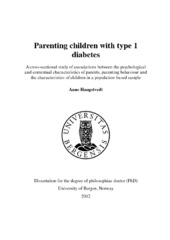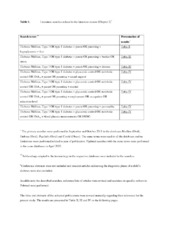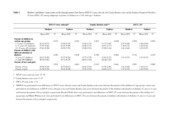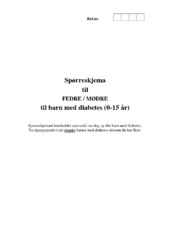| dc.contributor.author | Haugstvedt, Anne | en_US |
| dc.date.accessioned | 2013-03-20T11:06:43Z | |
| dc.date.available | 2013-03-20T11:06:43Z | |
| dc.date.issued | 2012-12-10 | eng |
| dc.identifier.isbn | 978-82-308-2159-6 | en_US |
| dc.identifier.uri | https://hdl.handle.net/1956/6439 | |
| dc.description.abstract | Background: Insulin treatment of children with type 1 diabetes requires multiple medical decisions and technical procedures every day. Although previous studies have mostly included mothers, parenting style has been associated with treatment outcomes among children and adolescents with type 1 diabetes. However, the psychological and contextual determinants for parenting among both mothers and fathers of children with type 1 diabetes, and their associations with the characteristics of the children are more rarely investigated. Aim: The main aim of this study was to analyse associations between the psychological and contextual characteristics of parents, diabetes-related parenting behaviour and the characteristics of children with type 1 diabetes in a sample of mothers and fathers of children with type 1 diabetes of all ages up to 16 years. Methods: Mothers (n = 103) and fathers (n = 97) of 115 children with type 1 diabetes younger than 16 years of age participated in this population-based cross-sectional survey. In addition to demographic data related to the parents and disease-specific and demographic data related to the children, the parents completed instruments measuring their fear of hypoglycaemia, perceived diabetes-related family burden, emotional distress, perceived social support and social limitation, relationship satisfaction and life orientation regarding their traits of optimism or pessimism. Regression analysis and correlation analysis were performed to analyse the associations between the variables. Results: The children in this study had mean HbA1c of 8.1%, and only 29% (n=33) of the 115 children had mean HbA1c ≤7.5% as recommended by international guidelines. The parents’ fear of hypoglycaemia was associated with poor glycaemic control and higher frequency of problematic hypoglycaemic events the past year among the children. The mothers reported more fear of hypoglycaemia and higher perceived burden related to the medical treatment than the fathers. The mothers’ fear of hypoglycaemia and perceived diabetes-related burden were significantly associated with emotional distress. The association between burden and distress was not significant among the fathers. The parents’ fear of hypoglycaemia and perceived diabetes-related burden were not significant associated with the children’s age and duration of diabetes. The parents’ perceived diabetes-related burden was, however, associated with nighttime self-monitoring of blood glucose every week or more often versus every month or less. An experience of nocturnal hypoglycaemia was associated with increased symptoms of emotional distress among the parents. A higher level of education and strong perceived social limitation because of the child’s diabetes among the mothers were associated with lower HbA1c among the children. A higher frequency of daily selfmonitoring of blood glucose was associated with improved glycaemic control and the children’s HbA1c increased almost linearly by age from 7 years and up. Conclusions and implications: The study has identified significant associations between the psychological and contextual characteristics of parents, diabetes-related behaviour and the characteristics of children with type 1 diabetes. Both clinical practice and future research should be aware of the association identified between the parents’ fear of hypoglycaemia and the children’s glycaemic control. Further, the burden and distress related to night-time caregiving and nocturnal hypoglycaemia need attention. The association between strong perceived social limitation among the mothers and better glycaemic control among the children may indicate that achieving satisfactory treatment outcomes among children with type 1 diabetes has certain costs, especially for the mothers. | en_US |
| dc.language.iso | eng | eng |
| dc.publisher | The University of Bergen | eng |
| dc.relation.haspart | Paper I: Haugstvedt, A., Wentzel-Larsen, T., Graue, M., Søvik, O. & Rokne, B. (2010) Fear of hypoglycemia in mothers and fathers of children with type 1 diabetes is associated with poor glycemic control and parental emotional distress: a population-based study. Diabetic Medicine 27(1): 72–78, January 2010. Full text not available in BORA due to publisher restrictions. The article is available at: <a href="http://dx.doi.org/10.1111/j.1464-5491.2009.02867.x" target="blank"> http://dx.doi.org/10.1111/j.1464-5491.2009.02867.x</a> | en_US |
| dc.relation.haspart | Paper II: Haugstvedt A, Wentzel-Larsen T, Rokne B, Graue M. (2012) Perceived family burden and emotional distress: similarities and differences between mothers and fathers of children with type 1 diabetes in a population-based study. Pediatric Diabetes 12(2): 107–114, March 2011. Full text not available in BORA due to publisher restrictions. The article is available at: <a href="http://dx.doi.org/10.1111/j.1399-5448.2010.00661.x" target="blank"> http://dx.doi.org/10.1111/j.1399-5448.2010.00661.x</a> | en_US |
| dc.relation.haspart | Paper III: Haugstvedt, A., Wentzel-Larsen, T., Rokne, B. & Graue, M. (2011) Psychosocial family factors and glycemic control among children aged 1-15 years with type 1 diabetes: a population-based study. BMC Pediatrics 2011, 11:118, December 2011. The article is available at: <a href="http://hdl.handle.net/1956/6438" target="blank">http://hdl.handle.net/1956/6438</a> | en_US |
| dc.title | Parenting children with type 1 diabetes. A cross-sectional study of associations between the psychological and contextual characteristics of parents, parenting behaviour and the characteristics of children in a population-based sample | en_US |
| dc.type | Doctoral thesis | |
| dc.rights.holder | Copyright the author. All rights reserved | |



